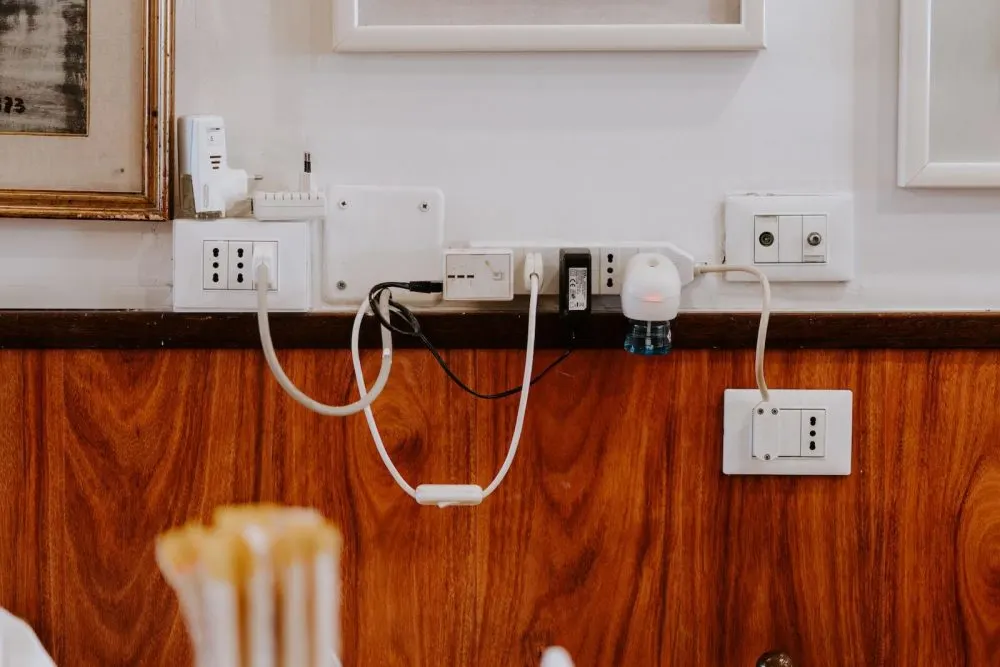Have you been sitting in your office and heard a strange noise from the speakers? It could be that they are buzzing! Here’s why and how to fix them. Speakers might buzz when the volume or bass is turned up too high. Sometimes speakers will also start to sound distorted. Nevertheless, let’s first try to understand why speakers buzz.
But why are my speakers buzzing?
There are multiple reasons why your speakers could be buzzing. The most common reason is when the volume or bass has been turned up too high, putting a lot of pressure on the speaker. This can cause a sound loop to form, making your speakers buzz.
This problem might also happen if you’ve used an audio cable with low-quality shielding between the speaker and the audio device. This can cause a ground loop to form, making your speakers buzz.
This problem might also happen if you’ve used an extension cable longer than necessary or faulty wiring. The wire acts as an antenna for outside noise – this can interfere with the signal going into your computer from your sound card (or vice versa) and create a buzzing sound!

What do I do now?
If you think any of these problems may be happening in your sound system, then there are a few things you should try doing before reaching out to customer service.
1. Troubleshoot by checking the speakers, knobs, cables, etc.
This is the first thing you should do be testing before anything else. Sometimes it’s as simple as turning the volume down, and your speakers will stop buzzing. Other times you may need to go through a few more steps before it stops buzzing.
If disconnecting and connecting all cables from the speaker doesn’t seem to solve the problem, we can start troubleshooting by checking for any loose connections on the back of your sound system’s input panel. These could be between your computer cable (if you’re using a laptop) or the audio device’s connection with other devices like a power cord, amp, etc…
After this, make sure no one has (accidentally) adjusted any equalizer knobs that control bass levels or trebles since the last time they were used – these adjustments might have caused distortion and increased pressure in our speakers which could have caused them to start buzzing.
2. You might have an electrical ground loop
An electrical ground loop is when two paths share at least one point where current can flow – this includes power cords for laptops and extension cords used to extend their reach! This will make your speakers buzz, and it’s a recurring problem.
If you think this is the problem, try unplugging and plugging in any loose cords, removing extension cables entirely from your system, or switching to a new cord for an audio device. You can also use an electrical ground loop breaker – these are often found at hardware stores like Home Depot and available at Amazon for a few bucks!
This Hum X ground isolator does the job:
You might also find it helpful to do this while listening to music on headphones. If the hum stops when you’re using headphones but continues when you’re not, we know there’s probably a grounding issue with our computer’s sound card or amp outputting signal back into itself through its power supply (and vice versa).
3. Stop using cheap cables
It’s important to note that many cables and cords for speakers are cheaply priced. This isn’t necessarily because they’re poorly made – but often, these products will have thinner wires which can lead to interference with the signal going into our computer from its sound card (or vice versa).
If you find this happening, your best bet is to switch over to higher-quality audio cables, including HDMI or optical cables, AC cords, etc., which are shielded or have ferrite bread to eliminate interference.
If none of these steps work, continue reading.
4. Avoid frequency interference
This might be a more advanced troubleshooting step, but if you’ve tried everything else and your speakers still seem to buzz, something may be interfering with the frequency of our audio signal.
Sound waves from power lines or a nearby radio station cause the most common sources of interference. However, in a house, there can be multiple electronic devices such as WiFi signals, Bluetooth devices, cellphones appliances like refrigerators or microwaves, and other sources of interference. Many Bluetooth devices, such as computer peripherals or the famous Apple AirPods, suffer from this problem.

You’ll need to investigate here if you’re not sure how your sound system is being affected by outside noise – try turning off all electronic devices in the same room as your speakers for a while and see if that solves the problem! If this isn’t enough, it might be time to contact an electrician who can help with more advanced grounding solutions.
5. Speakers still buzzing? You could have a blown speaker
Sometimes speakers will buzz because they’ve been blown out – this could be caused by a defect, an overload on the speaker, or even too much time playing at high volumes. If you think that’s the case, then it might be best to contact your local electronics store and see if they offer repairs for your particular speaker model. You can also try shopping online for new ones!
Bottom Line
There you have it – some solutions for fixing a speaker that buzzes. Now you can enjoy your favorite song or podcast without worrying about an annoying buzzing sound!
Animesh
Sunday 24th of July 2022
i have my right stereo buzzing and it goes away decreasing the volume but it forces me to have a significant difference between the volumes of two stereos which i find uncomfortable, what might be the problem here and what should i do to eliminate it?
Animesh
Sunday 24th of July 2022
it is a laptop btw
Pratik
Wednesday 9th of February 2022
Man, the extension box issue solved my problem. Thanks for this article 👍
Descriptive Audio
Wednesday 9th of February 2022
Glad to hear!